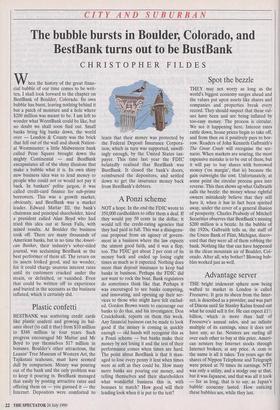Spot the bezzle
THEY may not worry as long as the world's biggest economy surges ahead and the values put upon assets like shares and companies and properties break every record. They should suspect that these val- ues have been and are being inflated by too-easy money. The process is circular. We see it happening here. Interest rates rattle down, house prices begin to take off, and from then on it positively pays to bor- row. Readers of John Kenneth Galbraith's The Great Crash will recognise the sce- nario. When markets are soaring, the most expensive mistake is to be out of them, but it will pay to buy shares with borrowed money Con margin', that is) because the gain outweighs the cost. Unfortunately, at some point the circular process goes into reverse. This then shows up what Galbraith calls the bezzle: the money whose rightful owners mistakenly believe that they still have it, when it has in fact been spirited away, under the cover of a general illusion of prosperity. Charles Peabody of Mitchell Securities observes that BestBank's missing $200 million is a bezzle. In the bubble of the 1920s, Galbraith tells us, the staff of the Union Bank of Flint, Michigan, discov- ered that they were all of them robbing the bank. Nothing like that can have happened in the clean mountain air of Boulder, Col- orado. After all, why bother? Blowing bub- bles worked just as well.


























































 Previous page
Previous page